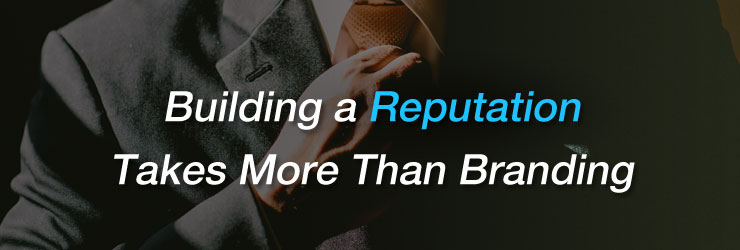A Cool Opinion: Building a Reputation Takes More Than Branding

On behalf of the staff at BQool, it gives me great pleasure to welcome you to our inaugural editorial, A Cool Opinion. This editorial was created with ecommerce entrepreneurs in mind, particularly sellers on the Amazon platform. As consultants, we do our best to not only understand the needs of our clients, but also give recommendations and explore the problems sellers deal with on a day-to-day basis. This is an opportunity to open up a genuine dialogue, one that I hope will encourage readers to contribute and challenge the way we do things at BQool. So, creed covered, let’s get on with the show. In this first issue, I wanted to take a look at building a reputation. Branding takes careful crafting and consistency, but the real work is developing trust.
Grand Slam Branding… Is It Enough?
Often when marketers hope to reach their target markets, maximum exposure with clever messages is relied upon. Most times, they’ll attach a lifestyle benefit: Red Bull and Nike take you to the next level to get out there and just do it (self-actualization); whereas KFC just wants you to lick your fingers, fulfilling your guts, literally and figuratively. It could be pitched based on the product features, or perhaps, targeting you at an emotional level, throw in a little jingle and who’s lovin’ it? You. But in this digital age, simply depending on a traditional sense of branding [1] is not enough. Your marketing might pack the rafters, but consumer power is growing and numerous apps and platforms have been built with their self-expressions in mind.
Take a step back from online retail for a moment and imagine that you’re going on holiday to an exotic location. What should you do? Where should you eat? Where should you stay? Now, think of 3 sites you would use to look up this information. Perhaps you see where I’m going with this? We might not always trust the information we find on such review platforms as yelp!, trivago or tripadvisor; but we all have go-to sources and trust that ‘real people’ are sharing their first-hand experiences on these sites.
Too Cool to Remain ‘Cadabra’
How Cadabra Inc. came to be the biggest online retailer this generation has ever known is an fascinating tale, one that has been covered so many times, I recommend you buy the book [2]. Early on, they were smart enough to incentivize associates to send customers their way, rapidly building inventory in various categories, as well as providing an outlet for consumers arriving en masse to buy, as well as critique the products they bought… books mainly, which naturally extended to reviews of other products and store feedback (once third party sellers came on board). “Cadabra is so good and they have the best deals, you should buy from it.” Trust me. No? Then, trust Amazon. On November 1st, 1994, Jeff Bezos shed his kitsch sub-magical company name and registered the URL for the legend that has become, Amazon.com.
Fast forward twenty-one years to the inaugural Prime Day and examine the powerhouse at their marketing best. According to JP Morgan, this boardroom-bred sales holiday geared exclusively for Prime members, brought in an additional 400 million dollars in revenue in 2015 [3]. 400 million dollars. The first year they ran the event… an event they ‘made up’ to increase Prime membership and as a bonus, generate more sales during the slow summer period. The following year, Prime Day became the biggest US sales day on record, exceeding Cyber Monday 2015 by 19 percent [4]. This was independently reported by Slice Intelligence, adding that on June 12th 2016, 74 percent of all US consumer e-commerce occurred on the Amazon.com platform [4], despite competitors offering their own sales events in an attempt to piggyback onto prime success.
Building Your Reputation on Amazon
If Customer is King, is Bezos the Queen? The high-ranked Amazonians at the Seattle HQ house the wizards and knights; the lower-ranked packers and pickers, the peons. So where does the Amazon seller come in? You are the merchants and farmers of the land. You may profit from the land, but there are strict terms and conditions to which you must abide and numerous taxes (read: fees) to be paid. Seller Performance and Rank count, as does the reputation of the store (Feedback Rating) and the wares and crops you provide (Product Reviews). This review system isn’t perfect by any means – an opinion is enough to qualify; but Verified Purchases have been vouched for by the land.
As a third-party seller on Amazon, you are not guaranteed success simply because you opened shop in the mega-retail domain. Whether you are a reseller or private label owner, the way to lift your profile is to play by their rules. Your shop will have more validity if it has a higher feedback count and rating than other competitors selling the same item. And when you own the brand and there are no competitors, it’s a matter of increasing reviews. In the next installment, we will zone in on the challenges sellers and private label owners face with building a reputation in Amazonia.
Learn more about:
How Important Are Amazon Product Reviews?
Amazon Verified Purchase: Policy Update and Seller Tips
Reference:
[1] https://www.entrepreneur.com/article/7740
[2] Stone, Brad. (2013) The Everything Store. London: Transworld Publishers.
[3] http://www.businessinsider.com/why-amazons-prime-day-its-biggest-sales-day-of-the-year-helps-the-company-so-much-2016-7
[4] https://intelligence.slice.com/amazon-prime-day-largest-online-shopping-day-history/








